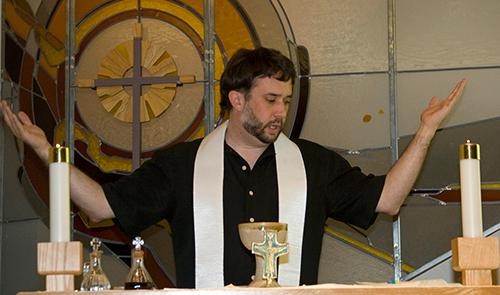You see them on the Mall — the booths proclaiming the respective truths of Jesus, Buddha and Mohammed — and stereotypes smite you like a lightning bolt from above.
With more than 20 religiously affiliated clubs registered with the Associated Students of the University of Arizona, religion claims a powerful role in the lives of many UA students.
And that’s not mentioning religious centers like the Latter-day Saints’ Institute of Religion, the Jewish Hillel Foundation, the Newman Center for Catholic students and the Islamic Center of Tucson, to name a few.
While many of these organizations continue to cultivate solid relationships with the university, stereotypes are tough to shake.
Joey Freund, a chemical engineering junior, is a peer minister with Episcopal Campus Ministry. Freund is one of those people you’ll see sitting on the Mall — but his sign is more about dissuading the Bible-thumping perception of Christianity.
“”A lot of people see Christians as the people who stop you in the hallway,”” said Freund. “”I sit on the Mall with a sign that says, ‘You’re not going to hell.'””
The Lutheran Student Fellowship agrees that most Christians don’t stomp the ground, ready to charge every time they encounter a non-believer.
“”People may be questioning what they believe, and what they grew up with,”” said the club’s president, David Maynard, a mechanical engineering and applied math junior. “”That doesn’t mean we go out there actively attacking, saying ‘You must come to us!'””
The president of the Skeptics Club, Antonio Roca, a philosophy and economics senior, debunked similar misconceptions about his own, critical-thinking based club.
“”We sit don’t around shouting, ‘We hate God!'”” said Roca. “”We’ve had a few Christians come consistently, and we listen to their arguments about God. We’re pretty civil.””
Meryl Press, an interdisciplinary studies sophomore, organizes community service for the Fellowship for Advancing Campus Engagement (FACE) — a branch of the Hillel Foundation for Jewish students.
“”There are stereotypes for every race, religion and culture,”” Press said. “”Things may not always be as they seem. I’m an adopted Asian. Most people wouldn’t see me as Jewish.””
Which begs the question — what actually goes on behind these stereotypes?
“”We’re planning a poker night right now,”” said Press. “”We feed off of each other’s ideas on how to make the community a little smaller.””
For most students, participation in religious (or non-religious) organizations extends beyond spiritual growth or critical thinking. Many of these groups strive for that cozy, “”there’s-no-place-like-home”” feeling.
“”For me, it’s a source of comfort, a way for me to relax,”” said Maynard. “”It gives me a purpose.””
Karen Seat, a religious studies professor, teaches the humanities course Religion in the American Experience.
“”Campus groups provide a positive social outlet for students to make friends and find community in a constructive way,”” said Seat.
Roca founded the Skeptics Clubs in pursuit of a community that could grow and think together.
“”We were trying to find like-minded people,”” Roca said. “”More people joined, and it turned into a socializing role.””
Press also relishes the community.
“”It’s a home away from home,”” Press said. “”Coming here, I was looking for a deeper meaning. How does religion fit in my life as I learn to live on my own?””
This question, and other tough ones like it, creates a need for groups that explore life’s complexities.
“”A lot of people are curious about religion,”” Freund said. “”They’re curious about what’s beyond what we see physically.””
Or not.
“”These clubs take things on faith,”” Roca said. “”You’re supposed to think critically in college. The entire academic community is based on this, and religion can impede the ability of people to think for themselves.””
Seat agrees that many people don’t understand or think about religion.
“”People have a low level of religious literacy,”” said Seat. “”I do think that the majority of students want to be tolerant of diverse religions and are interested in learning about them.””
This tolerance blossomed on Jan. 12 when Hillel and the University Religious Council organized an interfaith prayer and memorial service on the UA Mall for Rep. Gabrielle Giffords and the other victims of the Tucson shootings.
“”On campus, we want to engage Jews and non-Jewish students,”” Press said. “”After the shooting, we all came together and prayed.””
Press points out a moment where several communities became one.
The tables and fliers won’t vanish, and the crazies will stick around, but here’s proof that this campus can flourish as a place of unity instead of judgment.
That’s something to pray about or think on, whatever brings you fulfillment at the end of the day.









